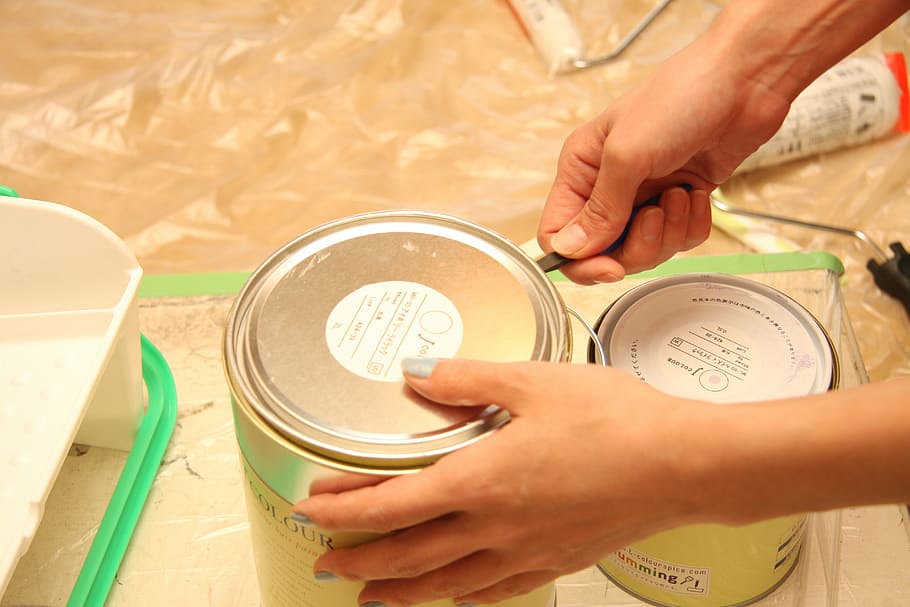Cold weather is here, but that doesn’t mean you have to stop painting. With a little preparation and care, you can keep your paint from freezing and complete all your projects during winter.
However, with improper planning, will paint can freeze over winter?

Paint cans can freeze in the winter, but it depends on how cold it gets and the paint you are using. There is also a difference between freezing and solidifying. Finally, it depends on what kind of paint is in the cans.
Many people think of freezing as something that happens to the water. However, freezing can also occur in many other liquid mediums.
In particular, latex paint can freeze if exposed to temperatures below about 35°F for an extended period.
However, latex paint should be fine if it is not frozen hard. Oil-based paint may freeze and separate over the winter, ruining your workday if you don’t notice it right away.
If you choose to paint from a can then a question is often asked can paint freeze? Especially in the winter season. Yes, paint can freeze, but not all paint does.
For example, latex paint will usually separate in low temperatures and return to a usable state when brought back above freezing. Oil-based products can freeze in a liquid state because they include additives to prevent them from solidifying.
Also, paint cans can freeze over winter. So, if you don’t want your paint cans to freeze in the cold temperatures, you need to take precautions. Paint cans are susceptible to freezing temperatures.
During the freezing period, the Freeze-thaw cycles cause the paint to gel, preventing you from stirring the paint well. After a long cold winter, it may not go back to normal consistency.
Paint can be considered ruined if it freezes, although you might try putting the can in warm water and stirring it with a stick to see if it goes back to normal.
The reasons are that when temperatures plunge, so does the water content inside the paint cans, thereby resulting in a frozen, unusable product.
So, the best way to deal with the issue is to prevent it by not exposing the paint cans to an intense cold temperature.
Paint cans freezing is an issue that can be prevented easily by following a few simple steps.
You can avoid freezing paint cans by storing them in a cool place. Allow plenty of room for the can because the paint expands when it freezes, and the lid may come off or dent the can. If you take these precautions, your paint will stay in good condition.
You can prevent paint cans from freezing by emptying the paint cans into a trash bag or a paper plate and properly disposing of them. Make sure that the paint has dried completely before you recycle the can.
If you need to use the same color of paint, measure out how much you need, pour it into a smaller container, and label it accordingly.
You can protect your paint cans from the cold with heat tape that wraps around the can so it does not freeze solid.
If you have large numbers of paint cans, you will also want to place them in a safe place to keep them off the ground with quality air circulation.
Wrapping the paint can in cloth is a simple, easy, and effective way to protect it from low temperatures.
You can use an old blanket or tarp to wrap the can. Wrapping the can should keep it protected from any drops below freezing unless you leave the can outside for a long time.
Paint cans should be kept in a warm closet or at room temperature. If you keep the paint cans away from drafts and outside walls, you can help to ensure that they won’t freeze.
In most cases, if a can of paint freezes, it means that the paint is ruined. So, the best way to avoid frozen paints is to keep them in a warm location, like a closet.
In the wintertime, when it is really cold, paint cans can freeze up if left out in a cold environment or out on the deck. If your paint does freeze up, here are some tips for unfreezing them without damaging them.
If you reside in a cold area and your paint cans freeze, bring the paint inside and let the ice melt completely before opening.
Paint that freezes will create air bubbles and could separate; waiting until it is thawed will help to ensure that you have a smooth, blended product when it comes time to use it.
Place your paint cans in a warm water bath. Bring the water to a boil and allow it to simmer on medium heat. Remove paint cans from water once they reach room temperature.
When the temperatures drop, paint cans can be the first to freeze. If the paint freezes, it can spill out of the can or even explode. The best way to avoid a messy disaster is to simply dispose of your unwanted paint.
The cans are usually filled with an absorbent material and then sealed in a plastic bag for disposal.
Will paint cans freeze over winter? Yes, it will freeze. Paint stored in unheated garages and basements can be susceptible to freezing, especially in climates with particularly cold winters.
Exposure to freezing temperatures can damage a paint can, causing it to bulge and leak or even begin the hardening process in the paint itself.
Also, different types of paint react differently when exposed to freezing temperatures. For example, latex paint may lose color intensity or separate from its pigments altogether.
On the other hand, oil-based paints tend to experience less pigment separation than latex paints but have a greater chance of hardening when frozen.
Once thawed, however, they can still be used successfully. Unfortunately, you can’t tell if frozen paint has hardened without opening the can to inspect.